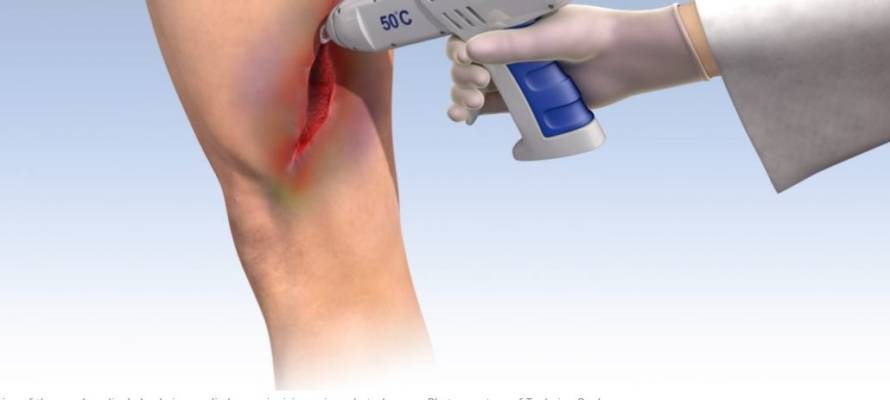Israeli scientists say their biocompatible nontoxic medical glue, delivered with a glue gun, is better than staples and stitches inside the body.
By Abigail Klein Leichman, ISRAEL21c
Hot-glue guns can be used for more than putting together cardboard furniture, home decorations, and toys. Researchers at the Technion-Israel Institute of Technology and Boston Children’s Hospital have developed a hot-glue gun to adhere torn human tissues together.
Most serious injuries are currently treated with staples and stitches that have many drawbacks. They are painful, leave scars, require high skill from the doctor, and sometimes have to be removed after the tissues heal.
Medical glue, on the other hand, can produce improved medical and cosmetic results. But the medical glues used today in dermatology and several other fields are very toxic and can be utilized only on the surface of the skin. In addition, hardening of the glue may make the organ less flexible or the adhesion may not be sufficiently strong.
With these limitations in mind, researchers have long been trying to develop a nontoxic glue that is suitable for different tissues and flexible after hardening. Such a glue would also need to decompose in the body after the tissue is fused together.
In an article published recently in the journal Advanced Functional Materials, Technion Biomaterials Laboratory head Prof. Boaz Mizrahi and doctoral student Alona Shagan introduce an invention that checks all those boxes.
The new approach is based on a biocompatible, low-melting-point, four‐armed N‐hydroxy succinimide‐modified polycaprolactone (star‐PCL‐NHS). Star‐PCL‐NHS is inserted into a hot-melt glue gun and melts upon minimal pressure, the team wrote.
Unlike the glue guns you can buy in a crafts store, this glue is delivered by a special medical glue gun that warms the glue to a moderate temperature – just above that of the body – so as not to cause a burn.
“The internal temperature of a ‘regular’ glue gun is about 160 degrees Celsius. To avoid tissue damage and pain, we have designed a special glue gun having an internal temperature of 50 degrees Celsius,” Mizrahi tells ISRAEL21c.
After the glue is squeezed directly onto the wound it quickly hardens, bonding strongly with both edges of the wound. The dried glue decomposes within a few weeks, so nothing has to be removed.
The researchers say their novel adhesive – formulated by altering its molecular weight to control adhesive strength, melting point, and elasticity — is four times as strong as existing medical adhesives and also can be used for gluing together torn tissue inside the body.
In-vitro (lab) and in-vivo (animal) evaluations confirm the effectiveness and biocompatibility of this system, they report.
The researchers believe the new concept will lead to the development of wound-management devices that will reduce the use of stitches, staples, and pins, speed up the healing process, and reduce scarring.
The research was funded by the US‐Israel Binational Science Foundation.
Do You Love Israel? Make a Donation - Show Your Support!
Donate to vital charities that help protect Israeli citizens and inspire millions around the world to support Israel too!
Now more than ever, Israel needs your help to fight and win the war -- including on the battlefield of public opinion.
Antisemitism, anti-Israel bias and boycotts are out of control. Israel's enemies are inciting terror and violence against innocent Israelis and Jews around the world. Help us fight back!























